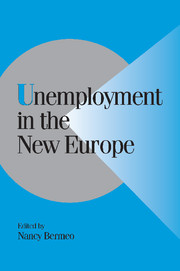Book contents
- Frontmatter
- Contents
- List of Contributors
- INTRODUCTION
- Part I Macroeconomic Contexts and Models
- 1 UNEMPLOYMENT, JOB CREATION, AND ECONOMIC AND MONETARY UNION
- 2 ORGANIZED MARKET ECONOMIES AND UNEMPLOYMENT IN EUROPE: IS IT FINALLY TIME TO ACCEPT LIBERAL ORTHODOXY?
- 3 GLOBALIZATION, WELFARE STATES, AND EMPLOYMENT: IS THERE A EUROPEAN “THIRD WAY”?
- Part II Unemployment and Domestic Bargaining Institutions: Challenging Some Myths
- Part III Unemployment and Domestic Bargaining Institutions: Three Cases
- Part IV Unemployment, Voting, and Political Behavior
- Index
3 - GLOBALIZATION, WELFARE STATES, AND EMPLOYMENT: IS THERE A EUROPEAN “THIRD WAY”?
Published online by Cambridge University Press: 26 March 2010
- Frontmatter
- Contents
- List of Contributors
- INTRODUCTION
- Part I Macroeconomic Contexts and Models
- 1 UNEMPLOYMENT, JOB CREATION, AND ECONOMIC AND MONETARY UNION
- 2 ORGANIZED MARKET ECONOMIES AND UNEMPLOYMENT IN EUROPE: IS IT FINALLY TIME TO ACCEPT LIBERAL ORTHODOXY?
- 3 GLOBALIZATION, WELFARE STATES, AND EMPLOYMENT: IS THERE A EUROPEAN “THIRD WAY”?
- Part II Unemployment and Domestic Bargaining Institutions: Challenging Some Myths
- Part III Unemployment and Domestic Bargaining Institutions: Three Cases
- Part IV Unemployment, Voting, and Political Behavior
- Index
Summary
“Globalization” may now be a buzzword, but it reflects an important if as yet poorly understood reality. A “new international division of labor” has emerged, with extensive and expanding trading networks between countries, as well as new production networks (or “chains”) established by multinational companies (MNCs). Tariffs have declined to negligible levels among the industrialized countries, and successive negotiation rounds of the General Agreement on Tariffs and Trade (GATT) have increased the openness to trade of the developing countries as well. Meanwhile, the latter have become major exporters of manufacturing goods. Their share of world manufacturing output grew from 5 percent in 1953 to 20 percent in 1994. The world trade–GDP ratio has doubled to around 15–20 percent since the 1950s, and the emergence of global markets has been accompanied by the growth of global production and intra-industry trade. Currency transactions, meanwhile, doubled between 1989 and 1992, to Ɂ.2 trillion per day – a figure much larger than the currency reserves of the world's central banks (Garrett 1998a: 790).
As a result of these and associated developments, it has been argued that the role of the nation-state in the international system has been fundamentally transformed. The “old” social contract – and its diverse institutionalization in Europe's welfare states – was very much part of the “golden age, ” during which there was a coincidence of national sovereignty (preserved with the help of exchange and trade controls), uninterrupted growth, and the Keynesian welfare state (Ruggie 1982). In the new “global era, ” so the argument goes, the state no longer has the capacity to defend competitiveness within economic borders or to sustain national social contracts and workers' rights and entitlements.
- Type
- Chapter
- Information
- Unemployment in the New Europe , pp. 87 - 118Publisher: Cambridge University PressPrint publication year: 2001
- 5
- Cited by



